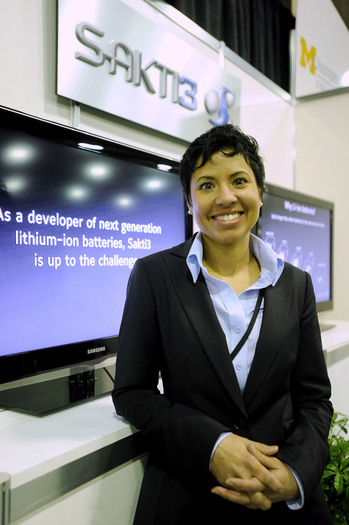Advanced battery technology startup Sakti3 has received a further round of investment capital to help bring its solid-state cells to market.
A new investor, British vacuum-cleaner maker Dyson, invested a total of $15 million and signed a joint-development deal with the company.
Existing funders General Motors and venture-capital firm Khosla Ventures also participated in the new round.
DON'T MISS: Sakti3 Claims Solid-State Battery Breakthrough For Electric Cars (Aug 2014)
Dyson hopes to integrate Sakti3's batteries, expected to have a higher energy density than today's lithium-ion cells, into vacuum cleaners and other products.

Ann Marie Sastry, CEO of startup lithium-ion cell maker Sakti3
Best known for its much-advertised vacuum cleaners, Dyson plans to bring as many as 100 new products to market within the next five years, according to the Detroit Free Press.
"Sakti3 has achieved leaps in performance, which current battery technology simply can't," said founder James Dyson in a statement
It's these fundamental technologies – batteries, motors – that allow machines to work properly."
ALSO SEE: GM Ventures Invests In Startup Michigan Battery Cell Maker (Sep 2010)
Sakti3 was spun out of research originally done at the University of Michigan; GM Ventures, the venture-investing arm of the carmaker, was an early investor almost five years ago.
Under the joint development agreement, Dyson will have first rights to use the company's cells in commercial products.
Battery startups often use smaller electric appliances to prove their cells' durability and real-world credentials before advancing to the longer-term and much tougher testing required for automotive use.
A123 Systems, for instance, produced batteries for hand-held power tools before starting to sell them to automakers BMW, Fisker, and others.
Sakti3 was founded by its CEO, Ann-Marie Sastry, more than five years ago.
She called the Dyson investment "a very significant event" for the company, and said the Dyson deal would be the most efficient way to get its cells to market, taking advantage of that company's fast product development.
MORE: Sakti3 Battery Firm: Key To GM 200-Mile Electric Car, $100 Per kWh By End Of Decade? (Sep 2014)
The long-term goal for Sakti3 remains the automotive market, she said.
Speculation that the company's solid-state cells would be used in the upcoming 2017 Chevrolet Bolt electric car, which promises a 200-mile range at a price of $37,500, now seems premature.
That car may instead use next-generation cells (and more of them) from GM's longtime supplier LG Chem, although the carmaker has not commented on what company will supply batteries for the car.
_________________________________________________













